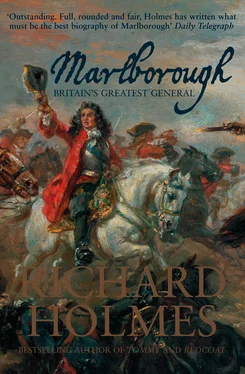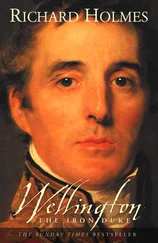This advance guard of cavalry was ‘to be commanded by our trusty and wellbeloved John Lord Churchill in all things according to the rules and discipline of war’, and Churchill had been appointed brigadier general for the purpose. 65 However, he was not entitled to give orders to the lords lieutenant, magnates like the Dukes of Somerset and Albemarle who were responsible for the county militias and commissioned their officers. He may have had a professional soldier’s grasp of tactics, but as the most junior baron in the House of Lords he was simply not in their league. On or about the eighteenth James decided to appoint Louis de Duras, Earl of Feversham, his lieutenant general for the campaign. Feversham was ‘to command in chief wherever he is, the militia as well as the King’s forces’. 66
There is no foundation for suggestions that this reflected a sudden loss of confidence in Churchill on James’s part. Churchill had only been appointed to head the advance guard, and command of the whole royal army evidently required a more senior officer. Not only has Winston S. Churchill’s assertion that Churchill ‘resented his supersession, and he knew it could only come from mistrust’ little contemporary foundation, but to maintain that ‘this snub … eventually turned Churchill from loyalty to the Stuart kings’ stretches the evidence to breaking point. 67 It was only later in the campaign, when he thought that Feversham was inclined to favour Colonel Theophilus Oglethorpe and to ignore his own contribution to the early stages of the campaign, that Churchill’s irritation can be detected.
On 21 June Percy Kirke joined a wholly unsnubbed Churchill at Chard with five companies of his regiment, having marched 140 miles in eight days. This now gave Churchill a small combined-arms brigade, and he told the Duke of Somerset that ‘I have enough forces not to apprehend [fear] the Duke of Monmouth, but on the contrary should be glad to meet with him and my men are in so good heart.’ 68 Although Churchill was not to know it at the time, Feversham was making good speed into the West Country, travelling with the remaining troops of the Life Guards and Royals, as well as the Horse Grenadiers, who looked ‘very fierce and fantastical’ with their moustaches and grenadier caps, even if their complicated drill made experienced officers grumble that no good would come from combining grenade-throwing with galloping about on horseback.
Feversham marched from London to Maidenhead on 20 June, reached Newbury the next day and joined the Dukes of Beaufort and Somerset at Bristol on the twenty-third. He had slipped Colonel Oglethorpe, with a party of Life Guards and Horse Grenadiers, off to his left flank by way of Andover and Warminster in case Monmouth tried to break eastwards between Churchill and his own force. There can be no faulting Feversham’s performance in the early stages of the campaign. He reached Bristol in time to thwart Monmouth, and screened his open flank as he marched. We cannot say for certain how close the militia were to total collapse, but a fragmentary undated letter from the Duke of Somerset to either Albemarle or Churchill shows the state he was in:
I do desire your Lordship to come away towards me with what forces you have, for I have only one regiment and one troop of horse which I am afraid will hardly stand because the others have showed them the way to run, the enemy is now at Bridgwater, which is ten miles of where I am, and that if your Lordship does not march to Somerton … 69
Monmouth might conceivably have beaten Feversham to Bristol, but he was raising troops as he advanced, so could not achieve Feversham’s turn of speed. As generations of holiday-makers know to their cost, the dryness of West Country summers cannot be guaranteed, and now the weather conspired against the soldiers on both sides. Nathaniel Wade recorded that on 22 June the rebels marched to Glastonbury on ‘an exceeding rainy day’ and quartered their infantry in the abbey and churches, making ‘very great fires’ to dry them out. On that day a patrol of the Oxford Blues, scouting out from Langport, met a stronger party of rebel horse and ‘beat them into their camp’, and the Portsmouth train of artillery, which had reached Sherborne with its escorting infantry of Trelawney’s Regiment, was ordered forward to Somerton by Churchill. This further increased the strength of his brigade, and on 23 June he told the nervous Duke of Somerset that he hoped to persuade Feversham to join him at Wells and fight Monmouth before he reached Bristol.
Feversham, however, had decided to head straight for Bristol, and reached it with his leading horse on the twenty-third, leaving the bulk of his infantry slogging out behind him along the Great West Road. Then, on the twenty-fourth, still before Bristol was firmly secured, the leading cavalry troop of Monmouth’s advance guard rushed the Avon bridge at Keynsham, only five miles away, and drove off the party of militia horse protecting civilian workmen who were damaging the bridge so as to prevent the rebels from crossing. It took Monmouth’s inexperienced officers the best part of twenty-four hours to get their men across the river and formed up in Sydenham Mead on the far bank. Monmouth decided to attack Bristol that night, and we cannot tell how its defenders, the Duke of Beaufort’s Gloucester militia, would have performed if put to the test. But the filthy weather induced Monmouth’s men to recross the river: a local royalist heard shouts of ‘Horse and away’ as they broke for cover. Those who could took shelter in the houses of Keynsham, and others were in the nearby fields ‘refreshing themselves’. The posting of sentries was not accorded high priority.
Feversham had spent much of the twenty-fourth at Bath, and when he heard that Monmouth had seized Keynsham bridge he sent Oglethorpe, who had commanded his flank-guard on the march west, to investigate. The Horse Grenadiers, at the head of Oglethorpe’s detachment, were as poor at their scouting as Monmouth’s men were at their sentry duty, and had actually reached the centre of Keynsham before the rebels turned out of the houses and opened fire. The royalists eventually had the better of the skirmish, with an anonymous rebel reporting: ‘They did us mischief, killed and wounded about twenty men, whereas we killed none of theirs, only took four prisoners and their horses, and wounded my Lord Newburgh, that it was thought mortal.’ 70 Oglethorpe, who had immediately charged to rescue the beleaguered Horse Grenadiers, actually lost two men killed and four wounded, and was in no position to force the issue. However, one of the captured troopers told Monmouth that Feversham’s main body was not far behind, and Monmouth resolved to fall back, along the south bank of the Avon, to Bath.
Monmouth reached Bath on the twenty-fifth, but the militia garrison refused to open the gates, and shot his messenger. He then headed south, for Frome, and on the evening of the twenty-sixth the royal army, now lacking only the guns from the Tower of London and their escorting companies of Dumbarton’s Regiment, linked up in the city. Churchill had marched in from the west, pausing briefly near Pensford to hang ‘Jarvis the feltmaker’, a Yeovil radical whose commission as a captain in the rebel army did not save him, though he died ‘obstinately and impenitently’, and we should remember him for that.
The astute historian John Tincey complains that Churchill had not managed to stop Monmouth’s march on Keynsham, and that had Bristol fallen its loss might have been laid at his door. Yet from the start of the campaign it had been Churchill’s plan to hang on to Monmouth’s flanks and rear: his getting ahead of the rebels only made sense if Feversham joined him, which is precisely what he had hoped for on 23 June. When Feversham decided instead to head straight for Bristol it was reasonable for Churchill to assume that the earl would watch his own front. The fact that Feversham had indeed begun to break down Keynsham bridge shows that he understood its importance, even if those hapless lads of the Gloucester militia did not.
Читать дальше












